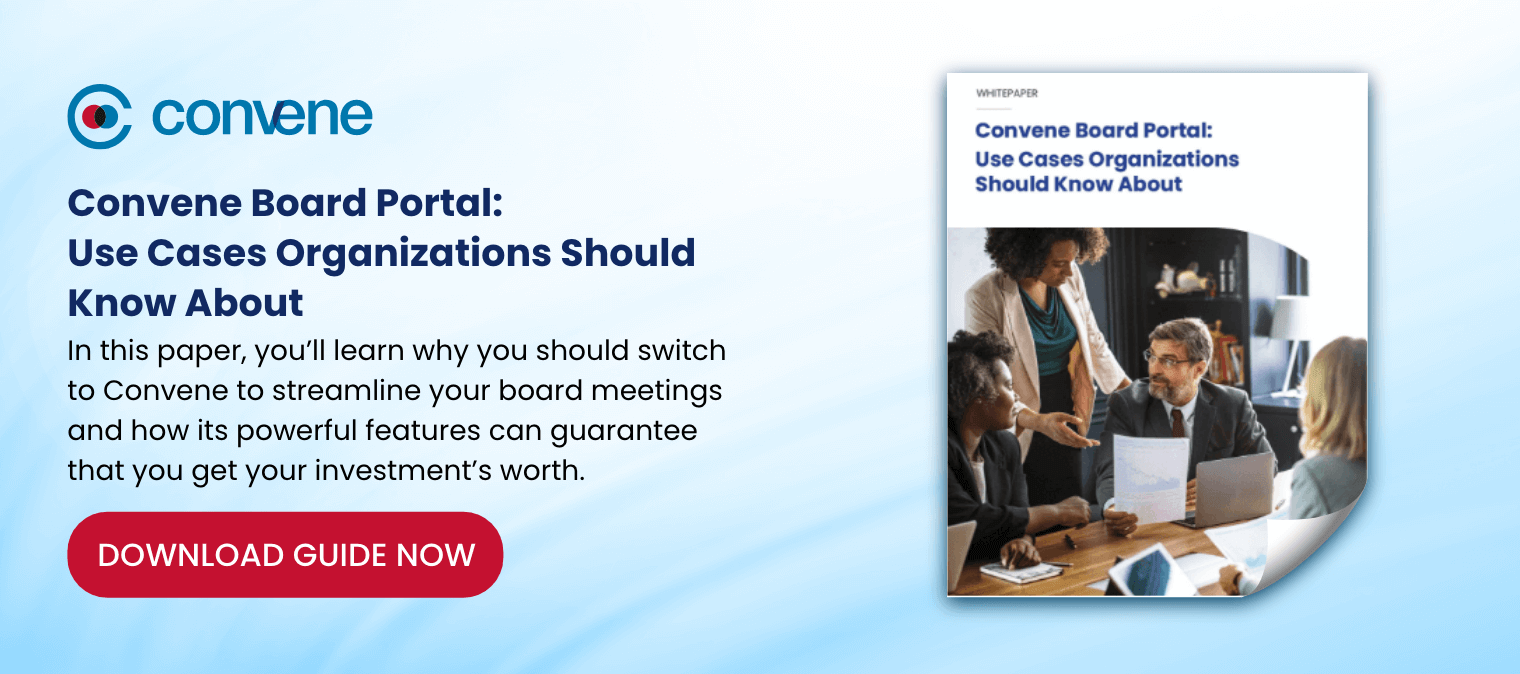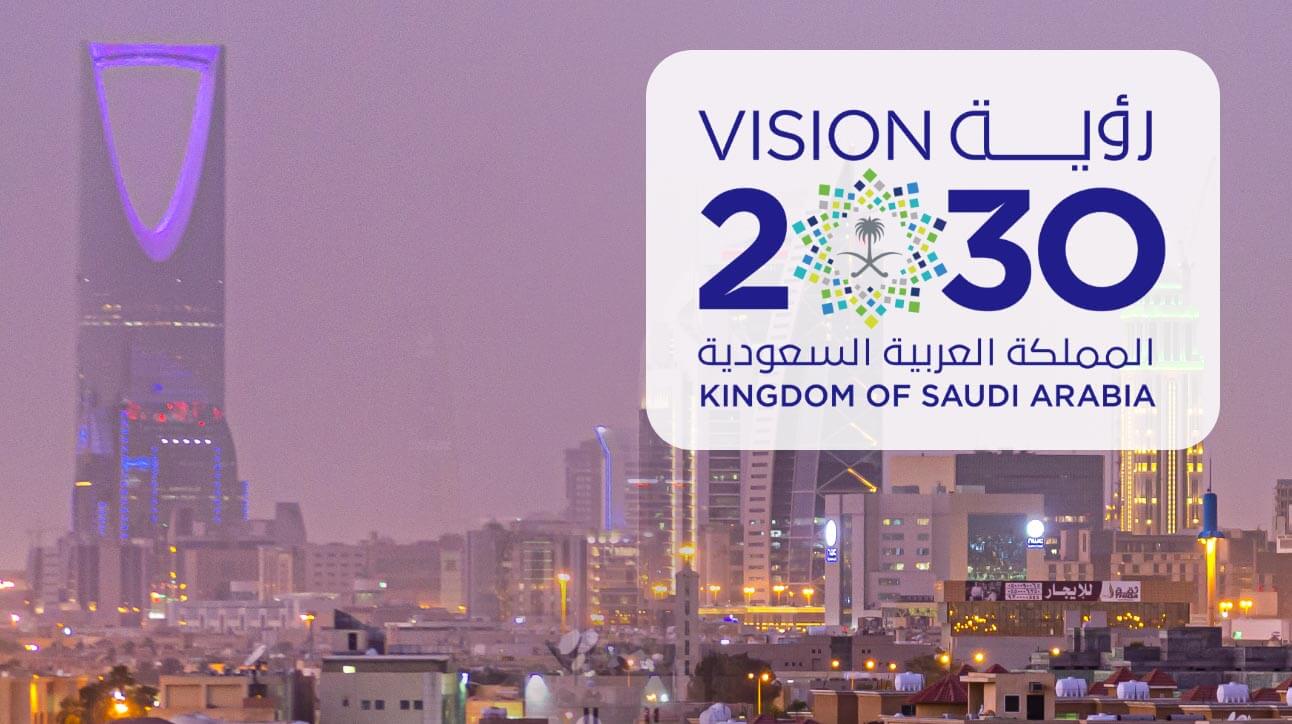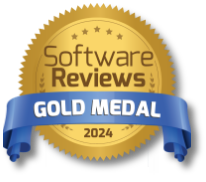In the last decade, slow processes and efficiency characterised public administration in Egypt. Services were difficult, if not impossible, to access, and hours of waiting time were normalised due to a lack of better infrastructure and organisation. The exact circumstances were found inside boardrooms.
Fortunately, business leaders decided it was time to stop this stagnation and start keeping up with the new age–fast.
In this article, we will delve into technology’s present and future role in Egypt’s public sector governance and how it is reshaping board management.
Egypt Vision 2030: Journey to Digital Transformation
Egypt is undergoing a major transformation in its digital infrastructure. The government has set its target on modernising its public administration functions using digital technologies to automate internal processes, minimise bureaucracy, and promote transparency. As part of Egypt’s Vision 2030, a comprehensive plan that connects both public and private sectors and enhances citizens’ service provisions has been initiated.
An important element in this shift is the Egyptian Digital Transformation Plan drafted in 2020 to build a digital economy. It houses three pillars: digital transformation, skill, and innovation. The goal is to strengthen e-governance further, build robust digital infrastructure, and provide people with innovations that help make their lives easier and better.
The Information Technology Industry Development Agency (ITIDA) is also key in encouraging the use of digital technology tools and supporting government agencies in their continuous efforts to design systems that are efficient and easy for everyone.
A Look at Egypt’s Public Sector Digital Transformation
The digital transformation of the following sectors is vital to the country’s sustainable growth. Here’s what is happening across these sectors:
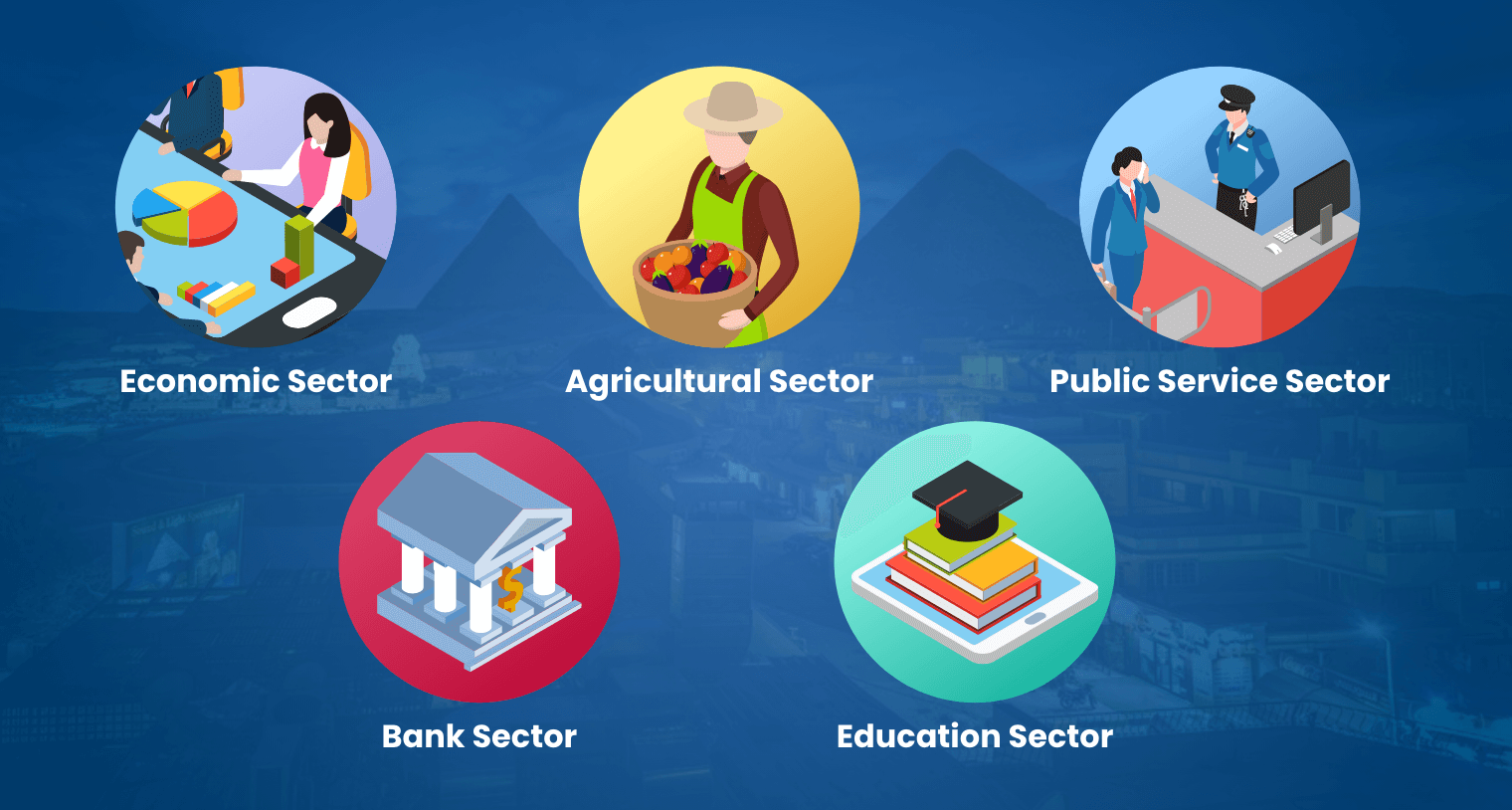
Economic Sector
In 2023, the United Nations Development Programme (UNDP) and ITIDA, under the Ministry of Communications and Information Technology (MCIT), launched a five-year project that aimed to bolster the success of information and communications technology or ICT entrepreneurs in Egypt.
The project is called the Maturation of ICT-Enabled Innovation-Driven Entrepreneurship Ecosystem Project, and its objective is to enhance Egypt’s tech sector by providing financing opportunities and mentorship in the Smart Village.
This initiative positions Egypt to meet the growing demand for rapid digital transformation while aligning with its long-term goals – Egypt Vision 2030. The project can potentially create a multiplier effect, accelerating progress toward key development objectives, such as economic growth and improved quality of life.
Previously, a joint project between UNDP and ITIDA concluded in 2021 with significant achievements. It generated 31,000 jobs, delivered training and upskilling for 1,550 entrepreneurs, and supported 1,800 startups across Egypt.
Agricultural Sector
As the world’s largest wheat importer and the second-largest grain importer, Egypt prioritises food security and self-sufficiency.
In a milestone initiative for the year 2024, the United Nations Industrial Development Organization (UNIDO), in partnership with Egypt’s Agricultural Research Center (ARC) and the Slovenian government, introduced Greendome Greenhouse Technology. This cutting-edge innovation enhances agricultural productivity by optimising growing conditions, protecting crops, and conserving water.
As part of UNIDO’s Tomato Value Chain project, Greendome supports Egypt’s shift toward sustainable farming by fostering the production of organic, healthy food in controlled environments.
Public Service Sector
In line with its National Digital Transformation Plan, Egypt is also at the forefront of advancing public services to provide its citizens with a better user experience.
The last quarter of 2022 found Egypt’s MCIT, in partnership with the GovStack Global Initiative and the Egyptian-German bilateral development cooperation, launching efforts to transform government services into a secure, efficient digital platform. GovStack’s implementation in Egypt focuses on enhancing civil servants’ digital skills, scaling sustainable e-government services, and fostering knowledge sharing through Communities of Practice to ensure effective and tailored ICT solutions. Hence, benefiting citizens by improving access to government services and reducing administrative challenges.
Bank Sector
Egypt is set to launch its first-ever native digital bank, One Bank, after finally getting the seal of approval from the Central Bank of Egypt (CBE). This marks a significant step in the digitalisation of Egypt’s banking sector. One Bank, a subsidiary of the state-owned Banque Misr, will offer 24/7 online access to accounts, reduce banking fees by eliminating physical branches, and provide more convenient and accessible financial services. The digital-only approach will also streamline operations, improve customer experience, and boost financial inclusion, making banking more accessible for underserved populations.
Education Sector
American University in Cairo (AUC) and King’s College London partnered with Egypt’s Ministry of Planning and Economic Development to launch the Leadership for Government Excellence (LGE) program to empower public sector leaders. The program aims to support Egypt Vision 2030 by equipping civil servants with the skills needed to lead, manage change, and drive innovation across various sectors, including economic development, energy efficiency, and social justice.
Since its launch in 2019, it has trained 120 government employees from 24 ministries, preparing them to guide public service operations in the New Administrative Capital.
The Role of Digital Transformation in Public Sector Governance and Board Management
In light of the recent developments that the country is currently making in terms of digitalisation, it is clear that Egypt stands on the brink of a significant evolution in governance and board management. If the current momentum is sustained, Egypt has the potential to fully leverage digital tools and systems to improve the country’s standard of living.
So, how does digital transformation contribute to the effectiveness of governance and board management in the public sectors in Egypt? Here are some ways it can help:
- Improved efficiency: Centralised digital solutions like the Digital Egypt platform enhance service delivery by providing citizens with round-the-clock access to government services. All these advancements make it easier for them to interact with public institutions and access necessary services anytime, anywhere.
- Increased transparency and accountability: One of the critical benefits of digital transformation is the enhanced transparency it brings to government operations. Digital tools make government data more accessible to the public, allowing citizens to track actions in real-time more easily. As a result, it encourages those in positions to be more responsible and accountable. This ultimately builds trust with the public.
- Better decision-making: From collection to analysis of large datasets, data analytics tools allow rapid data insights with minimum manual intervention. The results that boards can get from these analyses inform policy decisions and operational strategies. By identifying trends and patterns, boards can make more informed, evidence-based decisions that better meet the needs of citizens and stakeholders.
- Crisis management and cybersecurity: Boards must act quickly and decisively during emergencies. That’s why they need tools to facilitate smooth and rapid information sharing and coordinated responses to manage crises effectively. It also allows them to act proactively. Many of these platforms also offer cybersecurity features, such as real-time network activity monitoring, to detect suspicious behaviour or potential cyberattacks. In many ways, these tools support the early detection of threats, which enables boards to take preventive measures before a breach occurs.
- Enhanced board performance: By employing management tools like board portals, boards can have a single source of truth for all communications, documents, and meeting materials. It enables live video conferences so everyone can be present and engaged despite geographical differences. At the same time, it simplifies file approvals by automating workflows and providing a secure platform for digital signatures. Without the burden of manual processes, boards can become more productive and focus on other important tasks head-on.
How Board Portals Enhance Digital Governance in Egypt
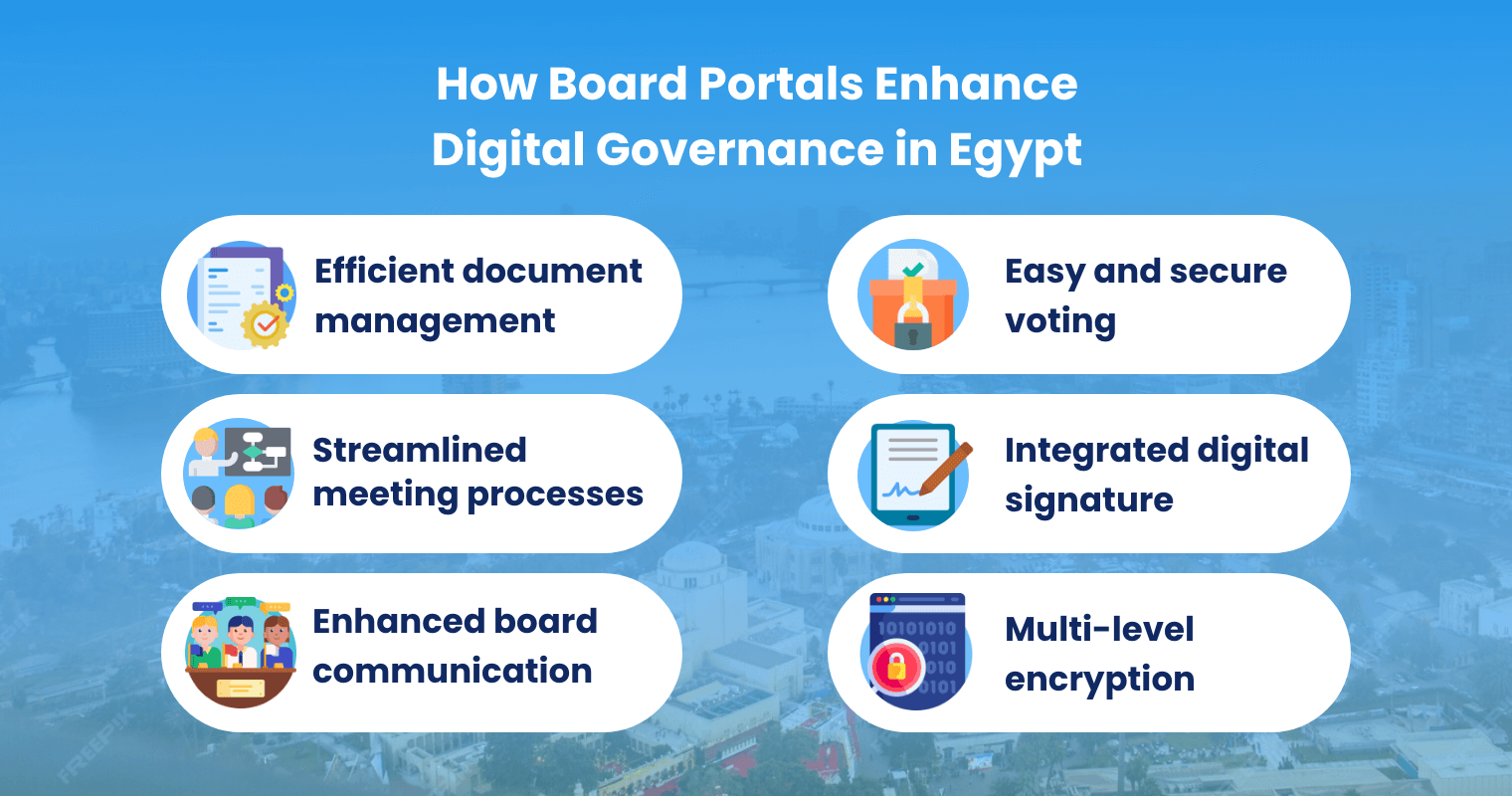
The digital shift is now more seen in boards and committees in public sectors in Egypt, where it mostly means improving board communications, cutting down on paperwork, and making decisions based on facts. One significant tool that makes this possible is a board portal, which allows for:
- Efficient document management: Board portals include advanced document management features, including a centralised document repository, that enable members to upload, edit, or share documents more easily. In this way, the administrative load is lessened, and all the board members are up to date.
- Streamlined meeting processes: One of the primary purposes of a board portal is to provide assistance when organising meetings, from building agendas to following up. This minimises time-consuming tasks and ensures that meetings are always productive.
- Enhanced board communication: Board portals are equipped with communication features, discussion boards, and other tools needed to collaborate in real-time. The use of these various tools ensures enhanced communication between board members, enabling everyone to be actively engaged and share their input during discussions and votes.
- Easy and secure voting: Speaking of votes, board portals also make up secure voting features that let board members cast their votes electronically with confidence. This improves the efficiency of the voting process while also ensuring that it is tamper-proof, thereby improving the quality of board decisions.
- Integrated digital signature: Board portals also support integrated digital signature functionality, allowing board members to sign documents securely and electronically from across the globe. It streamlines the approval process while ensuring legal compliance.
- Multi-level encryption: To safeguard sensitive information, board portals employ multi-level encryption protocols. This security feature ensures that all documents, communications, and data exchanges are securely stored and transmitted. Moreover, many board portals also offer customisable security preferences that let boards tailor access controls, authentication methods, and permissions based on specific roles or needs.
Looking Ahead: The Future of Digital Transformation in Egypt
In its efforts to modernise the nation, Egypt has been committed to one goal: digital transformation.
Egypt Vision 2030 is the strategic anchor of its digital transformation goals, consistent with the United Nations’ Sustainable Development Goals. Such an emphasis on sustainability and good digital governance provides the strategy with a long-term focus on societal enhancement through robust and transparent systems that ultimately benefit the state. The Egyptian state is moving forward with its 2030 targets through successful projects such as the ICT 2030 strategy and partnerships collaborated on by ITIDA to improve public service delivery and the satisfaction of the populace.
Egypt continues to implement major transformation processes, including but not limited to the development of the New Administrative Capital and the LGE program, which aims to strengthen human resources and modernise public service in Egypt. These transformation changes are expected to enhance efficiency and governance and transform the overall equation to differentiate Egypt from neighbouring countries.
Drive Digital Transformation with Convene
Business leaders globally are in a race to find the best tools that can accelerate digital transformation. While this could be an endless battle, they can surely take one thing off their plates when managing boards. Convene, a leading board management software, is a powerful tool that can help Egypt’s private and public sectors streamline their board operations and improve decision-making.
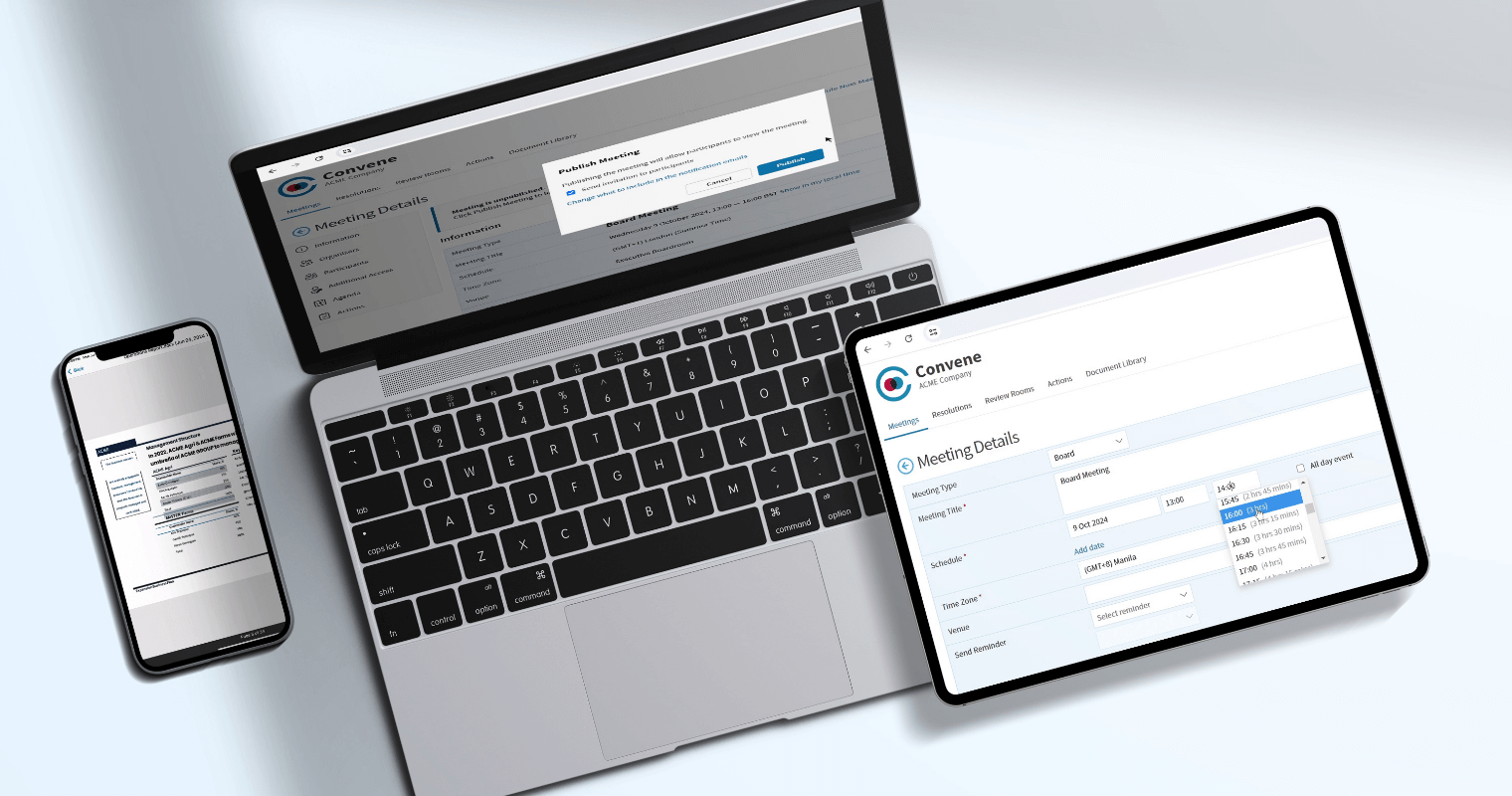
This has been proven by the success stories of organisations like the AUC and the African Export-Import Bank (Afreximbank), who are embracing the era of paperless meetings with the help of Convene. A senior executive from AUC shared how the board meeting software simplified their meeting preparation, “Once the meeting is published, all participants receive a calendar invite with the agenda attached.” Likewise, a representative from Afreximbank talked about Convene’s intuitive design and how it simplified boardroom management, “Convene is user-friendly software with the flexibility that can accommodate specific requirements. Users barely need training, as it is a straightforward platform.”
If you want to find out first-hand how Convene can impact the future of your board management, contact us today.
Jess is a Content Marketing Writer at Convene who commits herself to creating relevant, easy-to-digest, and SEO-friendly content. Before writing articles on governance and board management, she worked as a creative copywriter for a paint company, where she developed a keen eye for detail and a passion for making complex information accessible and enjoyable for readers. In her free time, she’s absorbed in the most random things. Her recent obsession is watching gardening videos for hours and dreaming of someday having her own kitchen garden.


